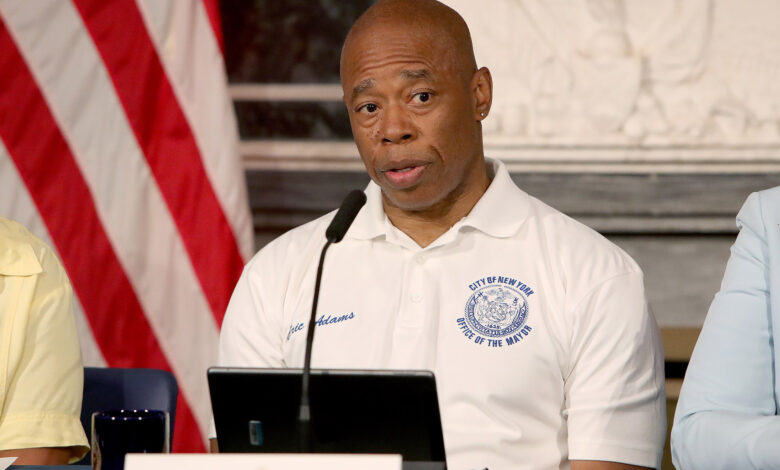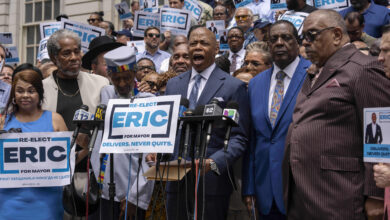Adams’ e-bike boondoggle does nothing for public safety

For four years, Big Tech has exploited New York City’s immigrant workforce as food-delivery apps turn a blind eye to the fact that the people who labor for them as “independent contractors” rely on substandard, potentially deadly e-bikes to do their jobs.
Now, City Hall is rewarding this irresponsible corporate behavior by subsidizing it, spending taxpayer money to do what the employers should do: give workers safe equipment.
New York City has become a more dangerous and disorderly place since 2020, in part due to the exponential proliferation of commercial e-bikes.
That year, as the pandemic created more demand for food deliveries from cooped-up New Yorkers, the state and the city legalized these motorized two-wheeled vehicles.
But the state and city did nothing to ensure workplace safety — or public safety.
On workplace safety: by the city’s estimate, “tens of thousands” of delivery workers use commercial e-bikes to bring food to Gotham residents.
Many work for apps such as UberEats and Grubhub.
But as independent contractors, they supply their own equipment.
Many have bought cheap, uncertified e-bikes equipped with batteries made in China, and store this equipment in apartment buildings.
On public safety: E-bikes are closer to motorcycles than to regular pedal bikes, because they can reach (and exceed) the 25mph vehicular speed limit.
Yet unlike motorcycle operators, e-bike operators aren’t required to have licenses, registration or insurance.
The result: disaster.
In less than five years, e-bike battery fires have killed 29 New Yorkers, many in cramped apartments.
Many of the victims didn’t even own delivery e-bikes, but were the unlucky neighbors of people and businesses that did.
And between 2021 and 2023, bicyclists killed seven pedestrians.
Before e-bike legalization, cyclist-on-pedestrian crash deaths were rare; it took more than a decade to rack up seven fatalities.
E-bike operators are dying in great numbers, too: Last year’s 30 cyclist deaths were the highest in a generation, reversing steady progress.
The greatest toll — 23 deaths — was borne by e-bikers.
Higher speed means less room for error.
The city has, at least — if belatedly — outlawed dangerous, uncertified batteries. And this may be working: Only one person has died in a e-bike fire this year.
But New York badly needs more rules to govern the e-bike food-delivery industry, including requirements for operator licenses and proof of insurance to protect both operators and pedestrian victims.
Apps and restaurants should also provide their delivery workers with any necessary equipment, maintaining and storing company-owned bikes in an industrial location with fire safeguards.
There’s precedent for such rules: Local law already requires apps to provide their delivery workers with bags for delivery, and the city determines minimum pay.
But instead of cracking down, Mayor Adams, encouraged by Manhattan City Councilman Keith Powers, is bailing the industry out.
Last week, the mayor announced America’s “first municipal trade-in pilot program to get unsafe e-bikes and scooters off our streets.”
If you can prove that you’re a regular food-delivery worker, you can take your fire-prone junk e-bike or battery to the city, and in return receive, in the city’s phrasing, a “certified e-bike and two compatible, UL-certified batteries.”
Like many things Adams does, this program is both too much and not enough.
The city estimates that $2 million will buy new equipment for 400 delivery workers.
That works out to $5,000 each – even though you can get a legal e-bike for $2,000.
Providing safe equipment for all delivery workers would thus cost tens or even hundreds of millions of dollars — which raises the question: How to pick just 400 recipients?
As Ari Kesler of My Battery Recyclers — who thinks this program is a “good start” — points out, there are “many thousands of bikes.”
And this program won’t start until next year.
If it’s meant to address a fire emergency, we can’t wait that long. And if it’s not an immediate public-safety hazard, then why do it?
Separately, the city also wants to allow businesses to “install public battery charging and swapping cabinets on sidewalks in front of their buildings,” the mayor says, to discourage “risky charging sites” on ground floors and in basements “that block exits.”
So this industry needs both public subsidy and public property to operate safely.
An industry that needs this much direct city aid to operate at minimum public-safety standards maybe shouldn’t be in business.
There should be no free — or cheap — lunch, delivered at taxpayer expense.
Nicole Gelinas is a contributing editor to the Manhattan Institute’s City Journal.




